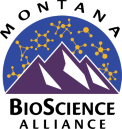When the potential scope of COVID-19 became clear in early 2020, Rocky Mountain Laboratories (RML) in Hamilton, MT, was one of the premier research facilities that set aside other work to focus on what became a pandemic. RML is part of the National Institute of Allergy and Infectious Diseases (NIAID) at the National Institutes of Health (NIH). Playing a significant role in the RML response is Dr. Marshall Bloom, a world expert in the molecular biology and pathogenesis of parvoviruses and flaviviruses, and authority in biocontainment. He explains that because of RML’s 100-year history of research in emerging infections, its scientists were well-positioned to quickly shift from other projects to COVID-19, and their work has been “productive and important.”
Dr. Bloom received his M.D. in 1971 and joined RML in 1972 as a research associate, briefly leaving Montana from 1975-77 for postdoctoral work at NIAID in Bethesda, MD. When he returned to Montana, he became a tenured investigator and charter member of the Laboratory of Persistent Viral Diseases. In 2004, his research group changed its focus from parvoviruses to the pathogenesis of tick-borne flaviviruses.
While he can take credit for many accomplishments at RML, he’s most proud of overseeing the construction of the NIH’s first biosafety level-four research facility, which is on the RML campus. Among many discoveries since opening in 2008, the program’s scientists helped develop an Ebola virus vaccine and are making crucial contributions to COVID-19 treatment and vaccine developments.
When he’s not working at RML, Dr. Bloom dedicates many hours to trout conservation. In fact, he is referred to as Dr. Trout, the name on his license plate. So when whirling disease attacked Montana’s wild trout population in the 1990s, Dr. Trout was the logical choice to head a Governor’s task force charged with combating the problem. Through research, management, education – and some help from Mother Nature – the disease ran its course and impacts have lessened on Montana streams. Dr. Bloom says the lessons he learned from navigating the varied interests of stakeholders during that process have served him well as he fights infectious diseases in people.
Dr. Bloom and his wife Tonia, a dedicated advocate for quality education in the community, raised two sons near Hamilton, both of whom are now scientific researchers – one at Fred Hutchinson Cancer Research Center in Seattle and the other at Harvard University.
Dr. Bloom is passionate about mentoring young scientists and researchers who will tackle infections of the future, and he’s a strong advocate of RML’s summer programs for university students. He says that Montana students are self-reliant, and this makes them especially competitive in scientific fields. In his role as a mentor, he has one piece of advice that might surprise some.
“I find that students will want to devote much of their intellectual effort to science. However, as a Classics major myself, I tell people interested in scientific careers not to forget classes in English composition, speech, and debate. Competency in these areas are assets that can’t be overstated.”
– Dr. Marshall Bloom, November 2020
Learn more about RML here (National Institute of Allergy and Infectious Diseases). Read about the lab’s COVID-19 work here (Bitterroot Star).
2020 Inductee

Dr. Marshall Bloom
Rocky Mountain Laboratories
Associate Director for Science Management, Rocky Mountain Laboratories, and Chief, Biology of Vector-Borne Viruses Section
